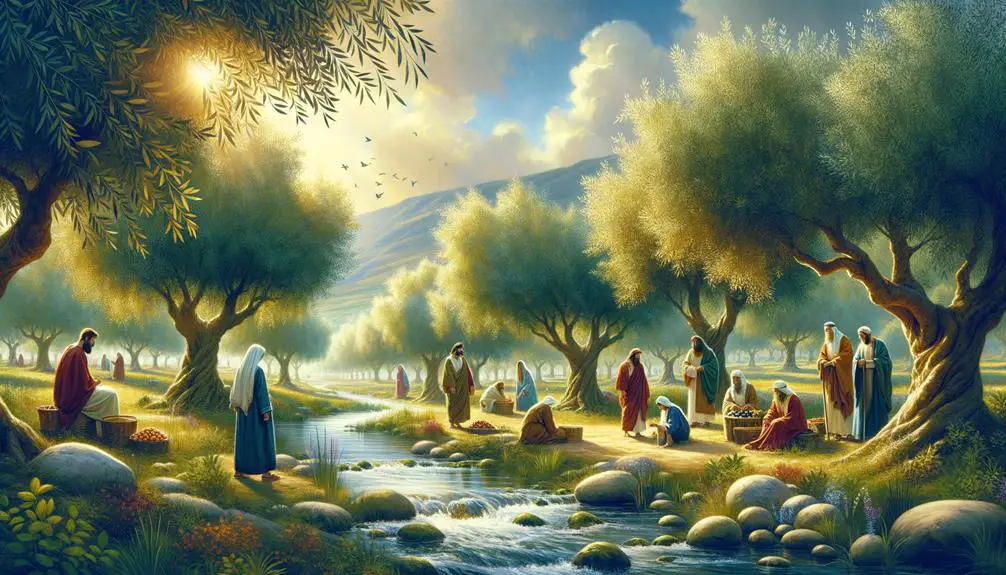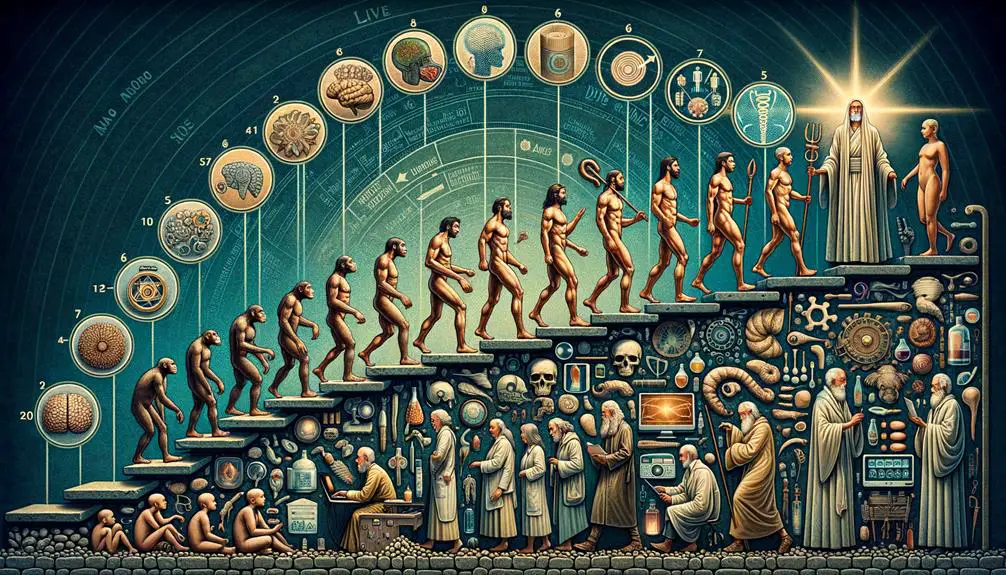Yield to curiosity and uncover the secrets behind the extraordinary lifespans in the Bible, where myth and history intertwine.

Why Did Humans Live Longer in the Bible
Have you ever wondered why, in the pages of the Bible, humans lived to such astonishingly ripe ages? It's a tale as old as time, yet it's one that continues to spark both curiosity and debate.
You might think it's all about divine intervention or mythological symbolism, but there's more beneath the surface. From the historical interpretations and dietary habits to the environmental conditions of the time, each aspect offers a piece of the puzzle.
As we peel back the layers of genealogical record-keeping and the evolution of lifespan perspectives, you'll discover intriguing insights that challenge what you know about longevity in biblical times.
Key Takeaways
- Biblical lifespans often symbolize virtues or divine favor, not historical accuracy.
- Ancient diets and environments contributed to perceived health, not necessarily longer lives.
- Divine intervention is a spiritual interpretation, offering metaphors rather than literal life expectancies.
- Modern understanding of science and healthcare has reshaped our perspective on longevity compared to biblical narratives.
Mythological Symbolism

How does mythological symbolism contribute to our understanding of the extraordinary lifespans recorded in the Bible? When you delve into the narratives of ancient scripture, you'll find that the extended years of life granted to biblical figures aren't merely historical records; they're rich with divine intervention and allegorical lessons. These stories, embellished with symbolic significance, offer you more than a glimpse into the past—they invite you into a deeper contemplation of faith and the human condition.
Through the lens of mythological symbolism, the remarkable ages of these biblical characters underscore a divine purpose. It's not so much about the literal number of years they lived, but what those years represent. The longevity serves as a testament to divine favor and intervention, a symbol of the profound relationship between the divine and humanity. It's as if each year added to their life is a marker of spiritual wisdom and fortitude, bestowed upon them by a higher power.
Furthermore, these extended lifespans can be seen as allegorical lessons designed for you, the reader. They emphasize the value of patience, perseverance, and living in accordance with divine will. In a faith-based analysis, you're encouraged to look beyond the surface and see these long lives as metaphors for spiritual endurance and the timeless nature of divine truth.
In essence, the mythological symbolism woven into these biblical accounts enriches your understanding by revealing the layers of meaning behind the extraordinary lifespans. It's a reminder that in the realm of faith, every detail holds a deeper significance, guiding you towards a more profound spiritual journey.
Historical Interpretations
CURRENT SUBTOPIC: Historical Interpretations
While exploring the mythological symbolism offers a deeper understanding of biblical lifespans, examining the historical interpretations can ground these narratives in the real-world context of ancient societies. You'll find that historical scholars have delved into how cultural biases and translation errors may have influenced our understanding of the long lifespans recorded in the Bible. These elements play a crucial role in deciphering the true nature of these ancient texts.
Cultural biases, for instance, could have led to the glorification of patriarchal figures through the exaggeration of their ages, serving as a metaphor for wisdom and divine favor. Similarly, translation errors from the original Hebrew texts into other languages might have introduced discrepancies in the numerical values, altering the perceived lifespans of these figures.
Influence |
Impact on Lifespans |
|---|---|
Cultural Biases |
May lead to exaggerated ages to glorify patriarchal figures, reflecting their wisdom and divine favor. |
Translation Errors |
Could result in numerical discrepancies, significantly altering the interpretation of biblical lifespans. |
Understanding these aspects requires a scholarly approach, blending faith with a critical examination of historical contexts. It's essential to navigate these interpretations with an analytical mindset, appreciating the faith-based narratives while also recognizing the potential for human error in the transmission of these ancient texts. Through this lens, you're invited to explore the complexity of biblical lifespans, enriching your understanding of these sacred narratives with a balanced perspective that honors both faith and historical scholarship.
Dietary and Environmental Factors

Beyond cultural biases and translation errors, another significant aspect to consider involves the dietary and environmental factors that may have influenced the remarkable lifespans recorded in biblical times. When you delve into the scriptures, it's clear that the ancients' diet, composed mainly of fruits, vegetables, grains, and occasionally meat, was significantly different from today's processed foods. This simpler, more natural diet, coupled with the physical demands of their daily lives, may have contributed to their overall health and longevity.
Moreover, the environment during biblical times was vastly different from today's world. The absence of modern pollution—industrial emissions, chemical waste, and other pollutants—meant cleaner air and water, reducing the risk of diseases associated with environmental toxins. This purer environment, combined with a lifestyle that was in harmony with nature, likely played a role in prolonging the lives of those in biblical times.
Another factor to consider is genetic diversity. Initially, humans had a broader genetic pool, which could have contributed to stronger health and longer lifespans. Over time, as populations grew and spread, genetic variations decreased, potentially making us more susceptible to diseases and health issues that our ancestors were better equipped to resist.
In examining these dietary and environmental factors within a scholarly, faith-based framework, it's vital to recognize how significantly our world has changed. While we can't replicate the exact conditions of biblical times, understanding these factors offers insight into how we might improve our health and longevity through better dietary choices and efforts to reduce modern pollution.
Genealogical Record-Keeping
In exploring the remarkable lifespans mentioned in the Bible, it's crucial to consider the role of genealogical record-keeping practices of the time. This aspect offers insight into how generations were documented and potentially, how lifespans were interpreted. The practice of recording genealogies was not merely for historical preservation but also served as a medium for cultural storytelling, deeply embedded in the fabric of society.
The meticulous nature of these records, often passed down orally before being inscribed, suggests a high value placed on ancestral lineage. However, this method also opens the door to numerical exaggeration, either to honor ancestors or to convey metaphorical truths rather than literal facts. This blending of cultural storytelling with genealogical record-keeping can help us understand the extraordinary ages reported in biblical texts.
Here's a brief overview of considerations in biblical genealogies:
Aspect |
Influence on Lifespan Reporting |
Scholarly Insight |
|---|---|---|
Oral Tradition |
May lead to exaggeration |
Enhances narrative, adds depth |
Ancestral Honor |
Incentive to extend lifespans |
Reflects societal values |
Metaphorical Interpretation |
Ages may symbolize virtue or importance |
Encourages deeper analysis |
Cultural Storytelling |
Merges history with morality tales |
Demonstrates the didactic purpose |
Literal vs. Symbolic |
Challenges direct interpretation |
Invites faith-based reflection |
Understanding these aspects underscores the complexity of interpreting biblical lifespans. It's not merely about taking figures at face value but delving into the cultural, spiritual, and historical contexts that shaped these genealogical records. This approach allows for a richer, more nuanced appreciation of biblical texts, recognizing them as intricate tapestries woven from threads of faith, culture, and human experience.
Evolution of Lifespan Perspectives

Having explored the intricacies of genealogical record-keeping, it's essential to examine how perceptions of lifespan have evolved over time within biblical contexts. The Bible's descriptions of longevity, from Adam living 930 years to Moses' 120 years, reflect a narrative that has puzzled and fascinated scholars and believers alike. This evolution in lifespan perspectives isn't just a historical curiosity but a spiritual and scientific dialogue that continues to this day.
- The Role of Divine Intervention: Biblical accounts often attribute long lifespans to divine will, suggesting a world where God directly influenced human longevity.
- Metaphorical Interpretations: Some scholars suggest that the extraordinary ages in the Bible may not be literal but symbolic, representing virtue, wisdom, or the significance of the individual in salvation history.
- Contrast with Modern Lifespans: Advances in modern healthcare and aging research have dramatically increased average lifespans, yet they also prompt a reevaluation of what it means to live a 'full life' in a biblical sense.
You're witnessing an era where faith and science intersect in unique ways. Modern healthcare and aging research have pushed the boundaries of what we understand about longevity, yet they also raise profound questions about the quality versus the quantity of life. This ongoing dialogue between ancient texts and contemporary science invites you to reflect on the biblical narratives of longevity not just as historical records but as part of a broader conversation about human existence, divine influence, and the pursuit of a life well-lived in the eyes of faith.
Frequently Asked Questions
How Do Modern Scientific Theories About Aging and Longevity Reconcile With the Extreme Lifespans Mentioned in the Bible?
Modern scientific theories about aging, like genetics, don't directly align with biblical lifespans, such as Methuselah's. You're facing a mix of faith and science here.
Researchers suggest genetics play a role in longevity, yet no current science explains such extreme ages. Some scholars propose calendar discrepancies might account for these figures, suggesting a different time measurement was used.
You're navigating a complex intersection where faith-based interpretations and scholarly analysis meet.
Are There Any Documented Cases or Studies Outside of Religious Texts That Suggest Humans Have Ever Lived as Long as the Bible Claims?
You're looking for historical verification or demographic data to back up claims of people living as long as the Bible states. Unfortunately, no documented cases or studies outside religious texts support these extraordinary lifespans. Scholarly and faith-based analysis suggests these accounts may serve more as symbolic or theological than literal historical records.
It's crucial to consider the differences in storytelling, cultural context, and the understanding of time when evaluating these ancient texts.
How Have Different Cultures and Religions Throughout History Interpreted the Concept of Extremely Long Lifespans?
Imagine diving into a sea of ancient stories, where mythological immortality isn't just a dream but a symbol woven into the fabric of various cultures.
Across history, different societies have interpreted the concept of extremely long lifespans through lenses of cultural symbolism and faith, each carving out its own understanding of life's length and its implications.
This exploration isn't merely academic; it's a journey into the heart of human belief and aspiration.
What Role Does Storytelling and Oral Tradition Play in the Preservation and Exaggeration of Lifespans in Ancient Texts?
You're delving into how storytelling and oral tradition have influenced the portrayal of lifespans in ancient texts. These narratives often blend mythical symbolism with fragments of historical accuracy, serving both to teach and to entertain.
Through this lens, exaggerated lifespans aren't just literal claims but carry deeper meanings, reflecting virtues, divine favor, or moral lessons. This approach underscores the importance of interpreting these texts within their cultural and religious frameworks.
Could Advancements in Genetic Engineering and Biotechnology Potentially Lead to Lifespans Similar to Those Described in the Bible in the Future?
You're venturing into a future where you might sip tea with your great-great-great-grandkids, thanks to genetic engineering and biotechnology. This isn't just science fiction; it's a possibility that raises deep ethical implications and profound socioeconomic impacts.
As you delve into this, consider how these advancements could reshape society, challenge our moral frameworks, and possibly widen the gap between the haves and have-nots. It's a future that demands careful, faith-informed reflection.
Conclusion
In your journey through ancient texts and modern interpretations, you've seen the majestic lifespans of biblical figures juxtaposed with today's reality.
It's not just about the food they ate or the air they breathed; it's about the symbolic essence of longevity in faith narratives.
The way we've evolved in understanding these lifespans, from literal ages to metaphorical messages, reflects a deeper quest for eternal life.
This exploration blends scholarly analysis with spiritual insight, inviting you to ponder the profound connection between faith, history, and human longevity.



Sign up